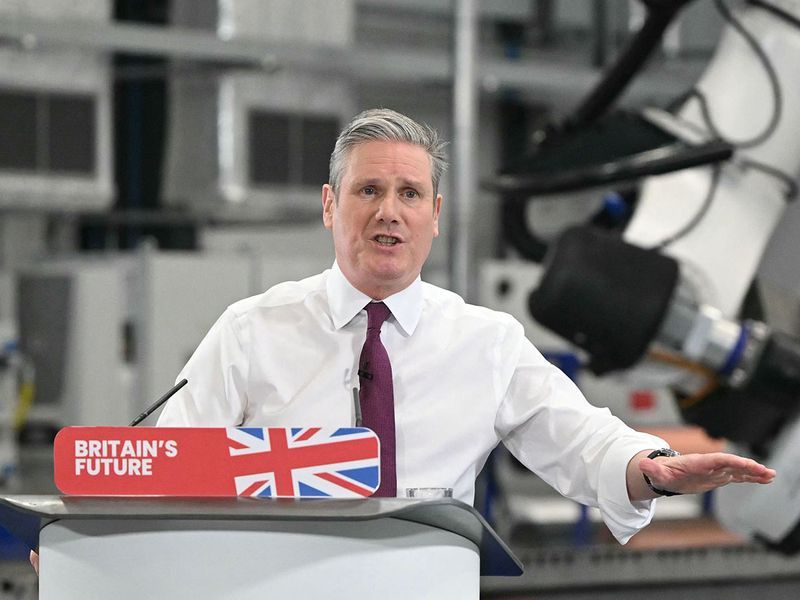
By convention, general elections in the United Kingdom are normally held on Thursdays. In Europe, there is a tendency for voters to go to the polls on Sundays. But the UK, as well all know only too well, gave up on Europe six years ago — Brexit and all that.
So political analysts in the UK are checking their calendars and pencilling in possible dates for the pending general election. It has to be held to before the end of January next year. Nobody, but nobody ever wants to call a general election in January. The last thing you’d need is trying to get your supporters to the polls when it’s cold, miserable or winters’ downpours are at their worst.
May is often a good time for a vote. The weather’s nice, there’s the optimism of summer to look forward to, and turnouts tend to be higher.
Just don’t expect Rishi Sunak’s Conservatives to call a general election in May. The last thing they need right now are voters turning out in droves — so many have already passed judgement on the Tories. The verdict? No good … not at all good.
This week the most comprehensive opinion poll in months was released and its findings reinforce what every political analyst, every politician and every voter knows. The Tories are toast. Done like dinner. On a hiding to nowhere.
Some 14,000 voters were consulted as part of the opinion poll — a huge sample by any reckoning — and therefore considered to be all the more accurate.
Putting it as plainly as I can, the Conservatives are going to lose the general election by a landslide.
When the counting is done, the Tories will be lucky to end up with 169 seats in the new parliament and are on course for their worst electoral defeat since 1997. Consider that the Tories under Boris Johnson went into this parliament with a comfortable 80-seat majority. But after 14 years of rule under David Cameron, Theresa May, Johnson, Liz Truss and Sunak, they have run out of steam. And support.
If the poll is right — and nothing in recent British political history suggests otherwise — Labour will win by a landslide and it will be Sir Keir Starmer who will have the benefit of a 50-seat majority or more, depending on whether the Scottish Nationalists can right their ship in the coming months and fend off Labour’s challenge north of the border in Scotland.
Labour has 41 per cent support nationally, Sunak’s Conservatives at 27 per cent, while the Liberal-Democrats under Sir Ed Davey are at 11 per cent.
Return to the Labour fold
According to the poll, 11 current Conservative cabinet ministers are set to lose their seats, with Jeremy Hunt, the Chancellor of the Exchequer, likely to be the highest profile loser when the election is called. And adding insult to the injury to be inflicted by voters, every one of those former Labour seats claimed by Johnson in 2019 in his promise to “get Brexit done” will return to the Labour fold.
Since the calendar rolled from December into January, political discourse in the UK has been dominated by the fallout from what’s commonly called the Post Office scandal. Hundreds of innocent post office franchise and shopkeepers were wrongly convicted of theft or false accounting all on the basis of a seriously flawed computer system.
The scandal reaches back to the Labour government of Tony Blair, but a whole cohort of officials, executives from Fujitsu, and prosecutors from the government entity are under the microscope and face calls for accountability and justice in what is rightly considered to be the worst miscarriage in the British judicial system since the wrongful convictions of the Birmingham Six and the Guildford Four in the 1980s.
The scandal has underscored a common belief that government and justice systems are stacked against the little fold, and it is an element in why the Conservatives, seemingly bereft of ideas and tainted by their failure to follow the rules their made themselves during the pandemic, have lost public trust — and voter support.

It’s all change
While Sir Keir was the Director of Public Prosecutions during part of the scandal — the Conservatives have tried to make him wear some of the fallout — the mud’s not sticking simply because it’s not relevant. The prosecutions of the Post Office employees were brought not as general criminal cases but as private prosecutions under powers handed to the entity by the Conservatives.
And while Sir Kier was theoretically in charge of every case brought by every prosecutor in England, Scotland and Wales, there were some 5 million cases and only four were processed by Crown justice officials in his employ. He simply would not have known about them.
What is more troubling is that Sir Ed Davey, the Liberal Democrats’ leader, was the minister with direct responsibility for the Post Office during the David Cameron coalition government. Sir Ed’s personal popularity has taken a tumble in light of the scandal, but not so support for his party.
Sir Ed openly says that he and other ministers were simply lied to on an industrial scale by Post Office officials and others who knew about the faults in the computing system and that the convictions were unsound. There certainly seems to be ample evidence emerging that this was indeed the case.
Since coming to office a little more than a year ago, Sunak has tried to focus his government’s actions on five key areas — each with a snappy slogan that is supposed to help with messaging. Lower inflation. Cut waiting times. Stop the boats. As things stand now, he’s posed to miss four out of five metrics he set, and the other would be considered a draw.
So, when will Rishi decide that it’s time to face the inevitable music? Smart money is on next November — likely Thursday the 14th. That will give him to at least try and convince a greater number of his party’s erstwhile supporters that they shouldn’t desert the cause entirely. By then, maybe inflation will have settled down and there might be some money in the coffers to promise limited tax breaks.
It’s a strategy that’s unlikely to work. After 14 years, three election wins, five Prime Ministers and countless scandals and too many words and too few actions, voters have had enough. Yes, from that opinion poll, the future is writ large for Sunak and his colleagues. It’s all change.











